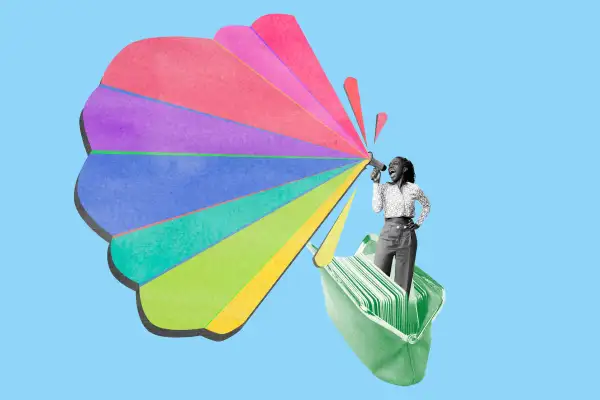'Loud Budgeting' Is the First Viral Money Trend of 2024 — but Does It Work?

Remember the "quiet luxury" trend? Thanks in part to the "vibecession," it was big in 2023. Perhaps best showcased by Succession and the Gwyneth Paltrow trial, quiet luxury centered around subtly showing off one’s wealth.
And now, according to social media users, it's totally passé.
On 2024 in/out lists, quiet luxury has been replaced by "loud budgeting," a new concept in which you make your frugal mindset obvious.
“It’s not ‘I don't have enough,’ it’s ‘I don’t want to spend,’” creator Lukas Battle put it in a TikTok video with over 1.4 million views. Or, as he said in another clip, it's “‘sorry, I can’t go out to dinner — I’ve got $7 a day to live on.’”
The term is spreading quickly across the internet. But could it actually work as a money-saving technique?
Julie O’Brien, SVP and head of behavioral science at U.S. Bank, says that loud budgeting can make people feel less alone and more empowered — especially in a world where social media can amplify one’s desire to keep up with the Joneses.
“They are saying there is no shame and guilt in their financial situation,” O’Brien says. “They are just saying, out loud, that healthy management of their money is something they value more than consumption and the curated, unrealistic ideals they see portrayed.”
As Brian Ford, a Northwestern Mutual wealth management advisor, points out, young people are facing hurdles like the recent return of student loan payments, lingering effects of record inflation and high interest rates. It makes sense, then, that they would want to spend meaningfully, “prioritizing their financial well-being” over something like a handbag or coat, he says.
The sheer fact that people are thinking critically about their spending is a huge step. So is publicly discussing it.
Talking about money is notoriously awkward, but loud budgeting encourages you to embrace it. This, too, has a perk: Like with regular New Year’s resolutions, telling others about your commitment to saving money can increase accountability, making it more likely you’ll follow through.
“Many people can identify with having to prioritize essentials like food and housing over disposable expenses, and loud budgeting is giving people a community where making those difficult-but-responsible choices can be celebrated,” Ford says.
Although vowing to “be obnoxiously CHEAP” in 2024 definitely has merits, it comes with downsides.
Ben Markley, a personal finance educator and content creator for YNAB, gives the example of sassily turning down a request from a friend to get drinks at a local bar. Maybe you’ll save a few bucks, but you risk alienating your friend and denying yourself some much-needed personal connection.
“Broadly being like ‘Anything that sounds expensive, I'm just gonna say no to’” isn’t quite the right approach here, Markley says.
Instead of blindly following the loud budgeting trend, he suggests using it as an opportunity to make sure your spending/saving habits are aligned with your goals.
Using an app, spreadsheet or even just a note on your phone, write out what you're hoping to accomplish, how much you think it’ll cost and how you plan to afford it. That way, the next time a friend asks you to drinks, you can make an informed decision.
“That empowers [you] to say, ‘I'd like to do that, but I really want to go to Colorado next summer,' or 'I really want to get these student loans paid off,'” he adds. “It also empowers you to say, ‘Actually, yeah, I decided this was important to me. I made space for it with my money. And so now I can say yes with confidence.’”
More from Money:
This Money Checklist Will Help You Crush 2024
Why 'Girl Math' Can Actually Make a Lot of Sense for Your Money
New Year, New Money Challenges: A Smart Way to Save or a Giant Waste of Time?

